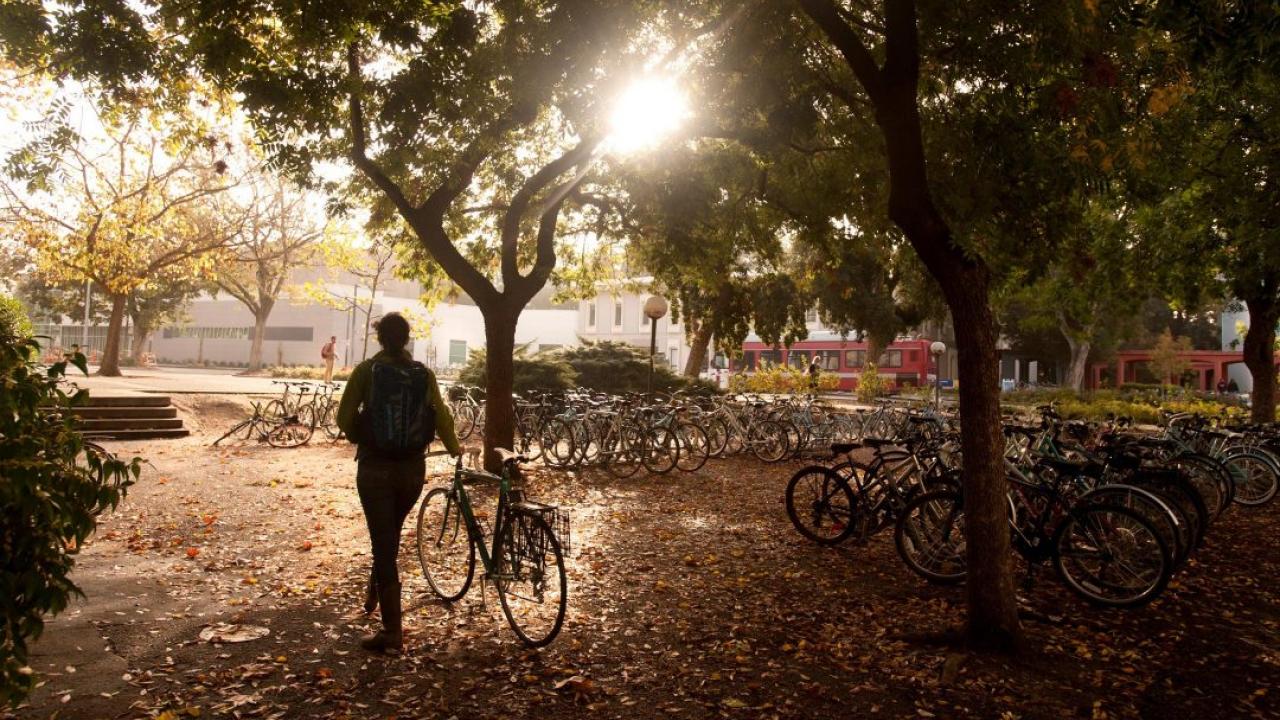I do a lot of things in an attempt to reduce my carbon footprint. I recycle and compost everything I can. We installed solar panels on our home and use our air conditioner sparingly. I eat meat rarely, though I haven’t given it up entirely. But my favorite thing? Riding my bike.
Bicycling is the most energy-efficient mode of transportation of all, more efficient even than walking. Had I driven rather than bicycled to my UC Davis office for the 16 years I’ve worked here, I would have produced something like 3.8 metric tons of greenhouse gases. Of course, I needed to eat more to power my bicycle, as pointed out by Harvard researchers, but even accounting for my food-related emissions, I saved 3 tons, a 78 reduction. My colleagues estimated in a 2016 report that widespread adoption of cycling worldwide, to an optimistic but not unrealistic level, could reduce greenhouse gas emissions by 11 percent by 2050.

Professor Susan Handy on her bike. (Courtesy Susan Handy)
The happiest commuters
I get many other benefits from bicycling, too. Better health is one of them. My five-mile round trip bike ride to campus equates to about 30 minutes of moderate physical activity, the daily dose recommended by the Centers for Disease Control and Prevention. Attaining this standard improves my cardiovascular system, helps to keep my weight down, and generally helps me live longer. It also improves my mental health. Did you know that the happiest and least-stressed commuters are those who bicycle? Many studies, including my own study on commute quality, show this convincingly.
A positive cycle
My bicycling helps to get other people bicycling. When people see people like them bicycling, they view bicycling as a normal thing to do and are more likely to do it themselves, as studies show. I like to think that seeing me on my bike has inspired at least a few other middle-aged women in Davis to get out of their cars and onto their bikes at least on occasion.
This is important because the more that people bicycle, the more investments in bicycle facilities (i.e. lanes, paths, racks, and so on) a city is likely to make. And the more and better facilities we have, the more that people are likely to bicycle. In addition, the more that people bicycle, the safer that streets become for bicyclists through an effect called “safety in numbers.” In other words, my bicycling contributes to a positive cycle (ha, ha) that benefits everyone.
Overcoming bicycling obstacles
So why don’t more people bicycle rather than drive? The answer is complicated, as my colleagues and I have found in our studies.
Most cities in the United States are not well designed for bicycling. Not only do they lack good bicycle infrastructure, they have sprawling, low-density development that puts destinations beyond a reasonable bicycling distance from home. Many adults were happy to bicycle as children but gave it up in high school and never got back to it. They may not feel comfortable bicycling, especially when they do not feel protected from car traffic.
Cities across the U.S. are working to overcome these obstacles through investments in bicycle infrastructure as well as programs designed to increase bicycle access, comfort, safety, and enjoyment.
I could go on and on. I like to tell my students that bicycles could save the world if only we let them, and I truly believe this. One need spend only a little time in the Netherlands or Denmark to appreciate how much better a bicycle-centric rather than car-centric world can be. I’m not saying that we need to get rid of cars entirely (my family still owns two, though the latest is a battery-electric Chevy Bolt), but the more of us who hop on our bikes rather than into our cars, the better the world will be.
Media Resources
Susan Handy is a professor of Environmental Science and Policy at UC Davis and director of the National Center for Sustainable Transportation.
